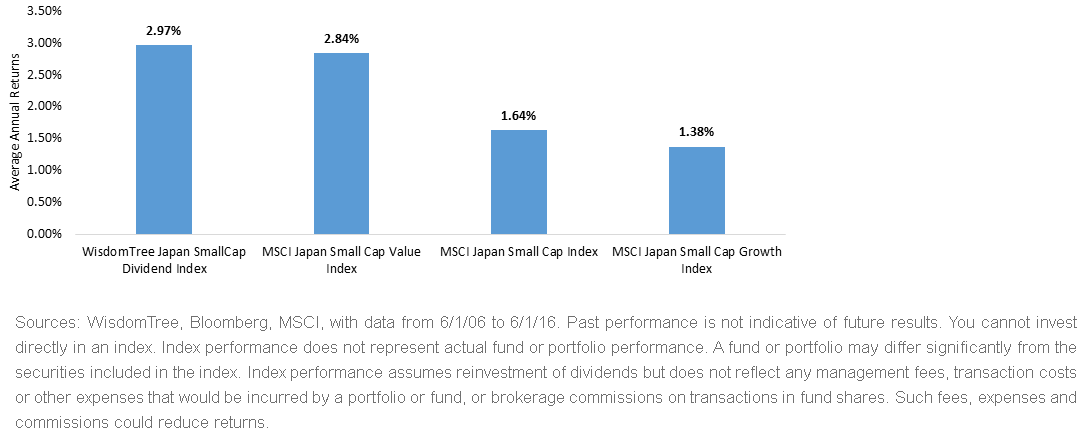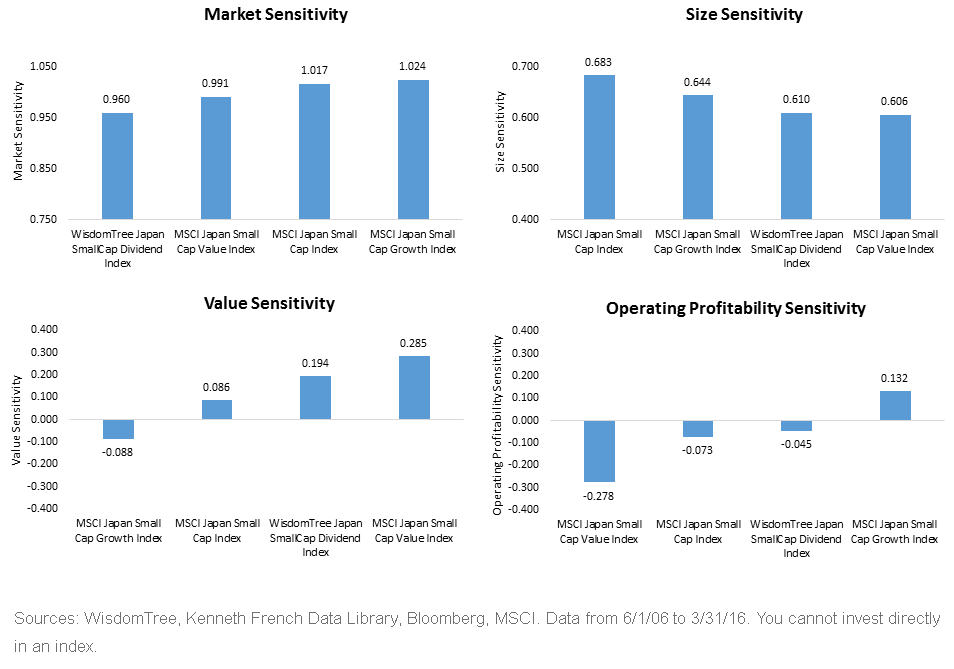Value Outperformed Growth in Japanese Small Caps


 How did WisdomTree’s dividend-focused approach to Japanese small caps outperform the other market capitalization-weighted approaches to small caps over this period?
The key: The WisdomTree Japan SmallCap Dividend Index is not a very selective index—the main measure of stock selection is actually zeroing in on the small-cap size segment in Japan. Beyond that, the approach seeks to include every regular dividend payer.
Japan’s Small-Cap Income Factor
How did WisdomTree’s dividend-focused approach to Japanese small caps outperform the other market capitalization-weighted approaches to small caps over this period?
The key: The WisdomTree Japan SmallCap Dividend Index is not a very selective index—the main measure of stock selection is actually zeroing in on the small-cap size segment in Japan. Beyond that, the approach seeks to include every regular dividend payer.
Japan’s Small-Cap Income Factor
 • Japan’s Small-Cap Income Factor Shows Lower Market Sensitivity: The margin is not large, but it is true that the WisdomTree Japan SmallCap Dividend Index did exhibit market sensitivity below 1.0 for this period. This means that the WisdomTree Japan SmallCap Dividend Index would have the potential to go up less than Japan’s market in upward-trending markets and down less than Japan’s market in downward-trending markets. Given, however, that this was only a 0.03 difference from the How term is in blog" target="_blank">MSCI Japan Small Cap Value Index, any difference in performance would be difficult to explain via this metric.
• Japan’s Small-Cap Income Factor Had Same Sensitivity to Size as Japan Small Cap Value Index: It is interesting that the sensitivity to size was basically equal between the WisdomTree Japan SmallCap Dividend and MSCI Japan Small Cap Value Indexes. The difference in performance would be tough to explain with this metric.
• Japan’s Small-Cap Income Factor Was a Bit Less Sensitive to Value: Companies in Japan tend to initiate dividends sooner over their life cycles than companies in the U.S., so it is not surprising that the WisdomTree Japan SmallCap Dividend Index did not exhibit that extreme of a sensitivity toward value. This would be one area that might explain the difference in performance between the WisdomTree Japan SmallCap Dividend and MSCI Japan Small Cap Value Indexes.
• Japan’s Small-Cap Income Factor Was Less Tilted to Weak Operating Profitability: If we had to hypothesize the critical difference between the WisdomTree Japan SmallCap Dividend and MSCI Japan Small Cap Value Indexes, this would be it this: The MSCI Japan Small Cap Value Index is much more tilted toward companies that exhibited weak operating profitability over this period. Among Japanese small caps generally, robust operating profitability did exhibit outperformance over weak operating profitability during this period.
WisdomTree’s first Index family just celebrated its 10-year anniversary. The WisdomTree Japan SmallCap Dividend Index represents one of these very first Indexes that has a 10-year track record of demonstrating added value versus other major benchmarks for its space. The factor analysis above suggests that the quality tilt that came with the dividend-weighted income factor was a key driver and value-add versus the traditional value indexes. This helps demonstrate long-term attractiveness of this strategy.
In the shorter term, our Japan CEO, Jesper Koll, believes small caps represent a secular growth opportunity for the local economy, based on a shortage of workers at the young side of the population. This shortage of workers is pushing up wages for recent graduates and supporting a new middle class of Japanese workers who are getting more full-time jobs.
The small-cap category for Japan is a great way to access this more local Japanese option, and we have now provided both hedged and unhedged versions of these Indexes to access this segment of the market.
Unless otherwise noted, data source is Bloomberg.
• Japan’s Small-Cap Income Factor Shows Lower Market Sensitivity: The margin is not large, but it is true that the WisdomTree Japan SmallCap Dividend Index did exhibit market sensitivity below 1.0 for this period. This means that the WisdomTree Japan SmallCap Dividend Index would have the potential to go up less than Japan’s market in upward-trending markets and down less than Japan’s market in downward-trending markets. Given, however, that this was only a 0.03 difference from the How term is in blog" target="_blank">MSCI Japan Small Cap Value Index, any difference in performance would be difficult to explain via this metric.
• Japan’s Small-Cap Income Factor Had Same Sensitivity to Size as Japan Small Cap Value Index: It is interesting that the sensitivity to size was basically equal between the WisdomTree Japan SmallCap Dividend and MSCI Japan Small Cap Value Indexes. The difference in performance would be tough to explain with this metric.
• Japan’s Small-Cap Income Factor Was a Bit Less Sensitive to Value: Companies in Japan tend to initiate dividends sooner over their life cycles than companies in the U.S., so it is not surprising that the WisdomTree Japan SmallCap Dividend Index did not exhibit that extreme of a sensitivity toward value. This would be one area that might explain the difference in performance between the WisdomTree Japan SmallCap Dividend and MSCI Japan Small Cap Value Indexes.
• Japan’s Small-Cap Income Factor Was Less Tilted to Weak Operating Profitability: If we had to hypothesize the critical difference between the WisdomTree Japan SmallCap Dividend and MSCI Japan Small Cap Value Indexes, this would be it this: The MSCI Japan Small Cap Value Index is much more tilted toward companies that exhibited weak operating profitability over this period. Among Japanese small caps generally, robust operating profitability did exhibit outperformance over weak operating profitability during this period.
WisdomTree’s first Index family just celebrated its 10-year anniversary. The WisdomTree Japan SmallCap Dividend Index represents one of these very first Indexes that has a 10-year track record of demonstrating added value versus other major benchmarks for its space. The factor analysis above suggests that the quality tilt that came with the dividend-weighted income factor was a key driver and value-add versus the traditional value indexes. This helps demonstrate long-term attractiveness of this strategy.
In the shorter term, our Japan CEO, Jesper Koll, believes small caps represent a secular growth opportunity for the local economy, based on a shortage of workers at the young side of the population. This shortage of workers is pushing up wages for recent graduates and supporting a new middle class of Japanese workers who are getting more full-time jobs.
The small-cap category for Japan is a great way to access this more local Japanese option, and we have now provided both hedged and unhedged versions of these Indexes to access this segment of the market.
Unless otherwise noted, data source is Bloomberg.
Important Risks Related to this Article
Investments focused in Japan increase the impact of events and developments associated with the region, which can adversely affect performance.
Investments focusing on certain sectors and/or smaller companies may be more vulnerable to any single economic or regulatory development.
Dividends are not guaranteed, and a company currently paying dividends may cease paying dividends at any time.

Christopher Gannatti began at WisdomTree as a Research Analyst in December 2010, working directly with Jeremy Schwartz, CFA®, Director of Research. In January of 2014, he was promoted to Associate Director of Research where he was responsible to lead different groups of analysts and strategists within the broader Research team at WisdomTree. In February of 2018, Christopher was promoted to Head of Research, Europe, where he was based out of WisdomTree’s London office and was responsible for the full WisdomTree research effort within the European market, as well as supporting the UCITs platform globally. In November 2021, Christopher was promoted to Global Head of Research, now responsible for numerous communications on investment strategy globally, particularly in the thematic equity space. Christopher came to WisdomTree from Lord Abbett, where he worked for four and a half years as a Regional Consultant. He received his MBA in Quantitative Finance, Accounting, and Economics from NYU’s Stern School of Business in 2010, and he received his bachelor’s degree from Colgate University in Economics in 2006. Christopher is a holder of the Chartered Financial Analyst Designation.

